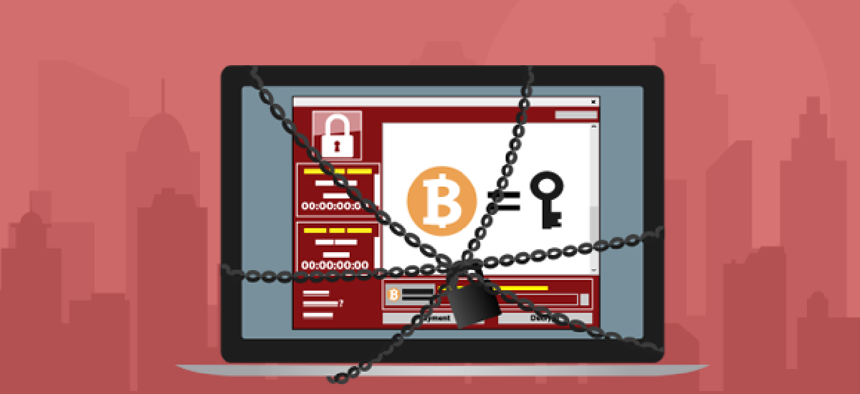Atlanta is the latest ransomware victim


Connecting state and local government leaders
After an attack that encrypted data across computers in Atlanta's government offices, the city is working with federal and industry cybersecurity response teams to determine the extent of the attack and unlock the computers.
Following am early-morning ransomware attack on March 22 that encrypted data across computers in Atlanta's city government offices, the city is working with the FBI, Department of Homeland Security, Microsoft and Cisco's incident cybersecurity response teams to determine the extent of the attack and unlock the computers.
The attack seems to have affected internal systems, and some customer-facing applications residents use to pay bills and access to court related information, city officials said.
The ransomware message demanded $51,000, or $6,800 to unlock each affected computer, according to a report from Atlanta NBC affiliate WXIA.
At a late-afternoon press conference, the city's newly appointed Chief Operating Officer Richard Cox said several city departments had been affected, but not those related to public safety, water or payroll.
Mayor Keisha Bottoms said the city has not yet determined if employee data has been compromised; she advised workers to be extra cautious, and proactively monitor their personal bank accounts. Likewise, anyone who has paid bills to the city of Atlanta or received payments, such as retirees, should be vigilant while the investigation is ongoing, she said.
The city's cloud-first strategy mitigated some of the effects of the attack, Interim CIO Daphne Rackley said. Atlanta has been migrating some of its major systems to the cloud to increase their security.
When asked about a remedy or workaround during this incident, Rackley again pointed to the cloud. "We do have a cloud strategy in place, so as we look to move critical systems to another infrastructure that is more secure and clean we are doing that, taking those steps." The city has implemented business continuity measures and has backups that will help it with restoration, she said. It is relying on the expertise of its federal and industry partners.
And while Rackley was unable to release much information regarding the attack and ongoing investigation, she did emphasize that the city went public with the news the same day of the attack, unlike many companies that suffer breaches but only notify victims days or weeks later.
Not all the city's networks seem to be affected, but some agencies were taking extra precautions.
Workers at city hall were instructed not to turn on their computers or log into their workstations on Friday, AJC.com reported.
Atlanta's Hartsfield-Jackson Atlanta International Airport has taken down its Wi-Fi network and parts of its website "out of an abundance of caution," an airport spokesman said Friday, March 23. Although the airport was not affected by the attack discovered Thursday, “we don’t want to open up the airport to any possible cyberattack,” he told the AP.
Emergency services and 911 were not affected, Chief of Police Erika Shields said at the Thursday afternoon press conference. However, the police department, "out of an abundance of caution, reverted back to doing our reporting on paper so that we would not unnecessarily compromise any existing systems," she said. Other than "not being able to spend time on the internet," the police department systems are still operational, she added.
As the officials who spoke at the mayor's press conference repeatedly said, Atlanta is not alone in falling victim to ransomware. In February, the WannaCry ransomware virus made its way onto about 160 computers in 11 different Connecticut government agencies, according to Mark Raymond, the state’s CIO. Other government victims include the Carroll County, Ark., Sheriff's Office, Montgomery County, Ala., and Mecklenburg County, N.C., which was attacked a second time after it refused to pay an initial ransom. A hacker group called TheDarkOverlord has even been trying to sell private records extorted from almost 100 schools and businesses.
"It’s not that the government is more susceptible to these types of attacks than the private sector, but that they’re a bigger target," Blue Ridge Networks ' Chief Operations Officer Maureen Gray said.
"Government systems have to be accessible to the public, for instance, to pay fees or find information. These public-facing networks must be better protected so that vulnerabilities there don’t affect more sensitive information on other systems," she said.
While government and industry cybersecurity experts have advocated hardening systems with continuous monitoring, intrusion detection technology and patch management, these approaches "invite the sort of reactive 'fire drill' mentality we’re seeing now," Gray said. A zero-trust stance, however, would help agencies proactively secure their networks because it "assumes everything on their systems is already compromised and blocks unacceptable actions."
NEXT STORY: Cybersecurity partnerships: Strength in numbers





